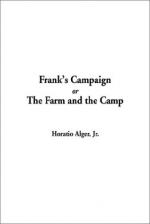“I hope he will be as urgent to have me stay. That will be a still higher compliment.”
“Here is the room you are to occupy, Mr. Morton,” said Mrs. Frost, opening a door at the head of the front stairs.
It was a large square room, occupying the front eastern corner of the house. The furniture was neat and comfortable, though not pretentious.
“I like this,” said the young man, surveying his new quarters with an air of satisfaction. “The sun will find me out in the morning.”
“Yes, it will remain with you through the forenoon. I think you will find the room warm and comfortable. But whenever you get tired of it you will be welcome downstairs.”
“That is an invitation of which I shall be only too glad to avail myself. Now, Frank, if you will be kind enough to help me upstairs with my trunk.”
The trunk was carried up between them, and placed in a closet.
“I will send for a variety of articles from the city to make my room look social and cheerful,” said Mr. Morton. “I have some books and engravings in Boston, which I think will contribute to make it so.”
A day or two later, two large boxes arrived, one containing pictures, the other books. Of the latter there were perhaps a hundred and fifty, choice and well selected.
Frank looked at them with avidity.
“You shall be welcome to use them as freely as you like,” said the owner—an offer which Frank gratefully accepted.
The engravings were tastefully framed in black walnut. One represented one of Raphael’s Madonnas. Another was a fine photograph, representing a palace in Venice. Several others portrayed foreign scenes. Among them was a street scene in Rome. An entire family were sitting in different postures on the portico of a fine building, the man with his swarthy features half-concealed under a slouch hat, the woman holding a child in her lap, while another, a boy with large black eyes, leaned his head upon her knees.
“That represents a Roman family at home,” explained Henry Morton.
“At home!”
“Yes, it is the only home they have. They sleep wherever night finds them, sheltering themselves from the weather as well as they can.”
“But how do they get through the winter? should think they would freeze.”
“Nature has bestowed upon Italy a mild climate, so that, although they may find the exposure at this season disagreeable, they are in no danger of freezing.”
There was another engraving which Frank looked at curiously. It represented a wagon laden with casks of wine, and drawn by an ox and a donkey yoked together. Underneath was a descriptive phrase, “Caro di vino.”
“You don’t see such teams in this country,” said Mr. Morton, smiling. “In Italy they are common enough. In the background you notice a priest with a shovel-hat, sitting sideways on a donkey. Such a sight is much more common there than that of a man on horseback. Indeed, this stubborn animal is found very useful in ascending and descending mountains, being much surer-footed than the horse. I have ridden down steep descents along the verge of a precipice where it would have been madness to venture on horseback, but I felt the strongest confidence in the donkey I bestrode.”




